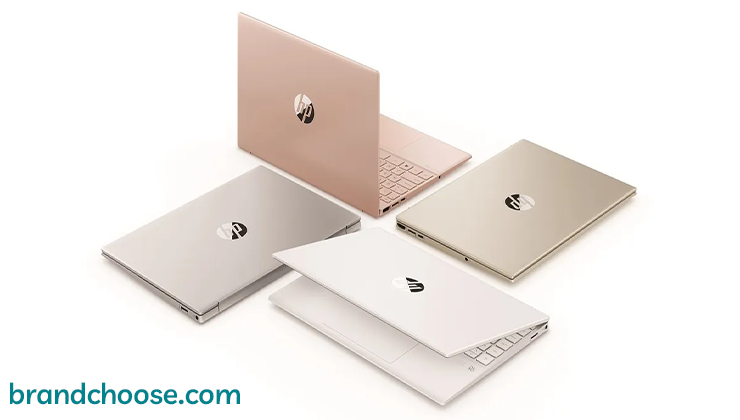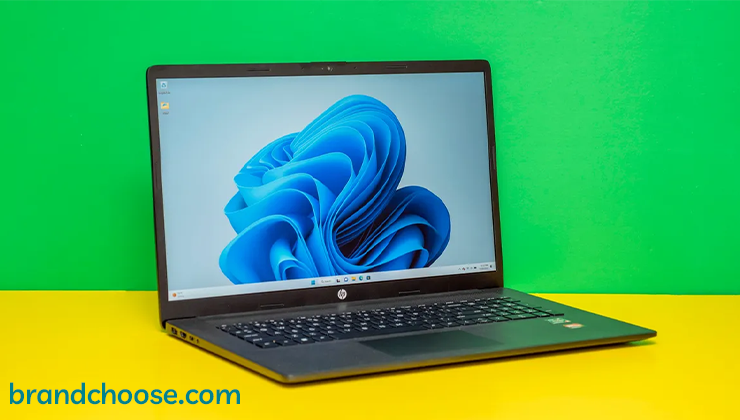Highlights
Diverse range of models – Entry-level to high-end Spectre
Business and consumer appeal – Popular in enterprise and home markets
Stylish designs – Premium looks in Spectre and Envy
Competitive pricing – Affordable Pavilion, premium Spectre
Reliable performance – Consistent across price points
Good customer support – Comprehensive warranties and service
Solid performance – Especially in gaming and professional categories
HP, a titan in the tech industry, continues to revolutionize the laptop market with its innovative range of devices. From sleek ultrabooks to powerful workstations, HP laptops embody a perfect blend of style, performance, and reliability. This article delves into what sets HP laptops apart, their strengths and weaknesses, and the effectiveness of HP's marketing strategies.

Product Selection
4.6 /5
HP offers a wide range of laptops that cater to different user needs and preferences, making it a versatile brand in terms of product selection. They have various series such as Pavilion, Envy, Spectre, and Omen, each designed for specific user groups. For instance, the Pavilion series is ideal for everyday use, while the Omen series is geared towards gamers. HP's Spectre series is known for its high-end, premium laptops with the latest technologies such as 11th Gen Intel Core processors, 4K OLED displays, and long battery life. However, this extensive product selection can also be a drawback as it can be overwhelming for customers to choose the right model. In comparison to other brands like Dell or Lenovo, HP's product selection is more extensive, but it may lack the simplicity and straightforwardness that some customers prefer. For instance, Lenovo's product line is more streamlined, making it easier for customers to choose. In terms of technology, HP is on par with other leading brands, offering the latest processors, high-quality displays, and other advanced features.
Affordability
4.3 /5
HP laptops offer a wide range of price points, catering to various segments of customers. The brand is known for its budget-friendly options like the HP Chromebook series and the HP Pavilion series, which are popular among students and casual users. On the other end of the spectrum, HP also offers high-end laptops such as the HP Spectre x360 and the HP Omen series, which are designed for professionals and gamers respectively. These models incorporate the latest technologies like Intel's 10th Gen processors, NVIDIA's RTX graphics, and offer features like 4K displays and long battery life, but they come with a higher price tag. When compared to other brands, HP laptops generally offer good value for money. While brands like Apple and Dell might offer superior build quality or customer service, they often do so at a significantly higher cost. On the other hand, brands like Acer or Lenovo might have cheaper options, but they often compromise on aspects like performance or durability. HP manages to strike a balance, offering reliable performance and decent build quality at a competitive price. However, one potential downside is that HP's after-sales service is sometimes criticized for being less responsive compared to some competitors.
Reputation
4.3 /5
HP, standing for Hewlett-Packard, has a strong reputation in the laptop market, being one of the leading brands globally. They are recognized for their wide range of laptops that cater to different consumer needs, from budget-friendly models to high-end, premium devices. HP's latest technologies, such as the HP Elite Dragonfly with its 8th Gen Intel Core processors and 5G connectivity, demonstrate the brand's commitment to innovation and performance. However, like any brand, HP has its pros and cons. One of the strengths of HP is its reliability; the brand is known for producing durable laptops with long lifespans. Their customer service is also generally well-regarded, providing support and assistance when needed. On the downside, some users have reported that certain HP laptops can be prone to overheating, and the brand's budget models may lack the high-end features found in similarly priced laptops from competitors. Compared to other brands, HP holds its own in terms of performance and quality, but may not always offer the best value for money, particularly in the budget range. Despite this, HP's strong brand reputation is well-deserved, with the company consistently producing high-quality laptops that meet a variety of consumer needs.
Customer Support & Warranty
4.0 /5
HP is widely acknowledged for its resilient customer assistance provisions within the laptop realm. The company presents a plethora of assistance avenues including telephonic aid, real-time messaging, social media outreach, and a comprehensive online assistance hub featuring an extensive knowledge repository, frequently asked questions, and community discussion forums. A recent addition to their repertoire of customer assistance technologies is the Virtual Agent, an AI-powered tool adept at diagnosing and rectifying common issues. Nevertheless, despite the generally laudable nature of HP's customer assistance, it is not without its imperfections. Several patrons have voiced grievances regarding protracted waiting periods and inconsistent service quality, with certain assistance representatives demonstrating commendable knowledge and helpfulness, while others appear less adept or informed. In comparison to rival brands such as Dell or Lenovo, HP's customer assistance is deemed to be on par, although each brand boasts its own unique strengths and weaknesses. For example, Dell distinguishes itself in telephonic support, while Lenovo garners acclaim for its expedient warranty service. HP's crowning achievement lies in its Virtual Agent, which, despite being a relatively nascent technology, has garnered commendation for its ability to swiftly and accurately resolve issues.
Battery Life
4.2 /5
HP laptops are renowned for their robust battery life, which is a critical factor for users who require portability and long hours of usage. The latest models like the HP Spectre x360 come equipped with a 4-cell, 61 Wh Li-ion polymer battery that can last up to 22 hours, depending on the usage and power settings. This is a significant improvement over previous models and is among the highest in the industry. The fast charge technology also ensures that the battery can charge up to 50% within 30 minutes when the system is off or in standby mode. However, like any other brand, the battery life of HP laptops can diminish over time and with heavy usage. Also, high-performance tasks and brighter screen settings can drain the battery faster. Compared to brands like Apple and Dell, HP laptops offer competitive battery life. For instance, the Dell XPS 13 also provides a similar battery life, while the MacBook Air lasts up to 18 hours. However, the fast charging feature in HP laptops gives them an edge over many competitors. It's also worth noting that the actual battery life can vary significantly based on the specific model, configuration, applications, features, and overall system usage.
Display
4.2 /5
HP laptops are renowned for their high-quality displays that provide excellent visuals and color accuracy. Most HP laptops, including the popular models like HP Spectre x360 and HP Envy 13, come with IPS (In-Plane Switching) displays that offer wide viewing angles and brilliant color reproduction. The HP Spectre x360, for instance, boasts a 13.3-inch Full HD (1920x1080) IPS touch screen display, while the HP Envy 13 features a 4K IPS display, providing users with a sharp, clear, and vibrant viewing experience. Some high-end models also offer OLED display options that deliver deep blacks and rich colors. However, the display brightness on some HP laptops, especially the budget models, can be a bit on the lower side compared to other brands like Apple. This might make them less suitable for outdoor use or brightly lit environments. Additionally, while the color accuracy is generally good, it may not be up to the mark for professional graphic designers or photographers who require extremely accurate color reproduction. Compared to brands like Lenovo and Asus, HP laptops may also have slightly thicker bezels, which could be a downside for users who prefer a more modern, edge-to-edge display design.
Performance
4.4 /5
HP has consistently been a top performer in the laptop market, offering a range of models that cater to different performance needs. HP's latest laptops are equipped with the most recent technologies, such as the latest generation of Intel Core processors, high-speed SSD storage, and powerful graphics cards, which significantly enhance the performance of the laptops. For instance, the HP Spectre x360 15, one of the brand's top-tier models, is powered by an Intel Core i7 processor and an NVIDIA GeForce GTX 1650 Ti, making it highly capable of handling demanding tasks and applications. However, while HP laptops generally offer good performance, they are not without their downsides. Some users have reported that certain models can run hot under heavy load, which could potentially affect long-term performance and durability. Additionally, while HP's performance is generally competitive, it may not always match up to brands like Apple or Dell in certain aspects. For example, Apple's MacBook Pro is known for its superior processing power, while Dell's XPS series often gets high marks for its excellent balance of performance and portability. Nonetheless, HP laptops still represent a solid choice for those seeking reliable performance, particularly for business and home use.
Design & Style
4.1 /5
They offer a wide range of designs, from the premium Spectre x360 series, known for its striking gem-cut design and attention to detail, to the more conventional Pavilion series, which balances style with affordability. HP's focus on design has increasingly leaned towards sleekness and portability.

Conclusion
HP laptops continue to push the boundaries of innovation, offering a diverse range of devices that cater to various user needs and preferences. While facing challenges such as bloatware and pricing, HP's commitment to innovation, build quality, and security ensures its continued relevance and success in the competitive laptop market. With effective marketing strategies and a dedication to customer satisfaction, HP empowers users to unleash their creativity and productivity with cutting-edge laptop solutions.





